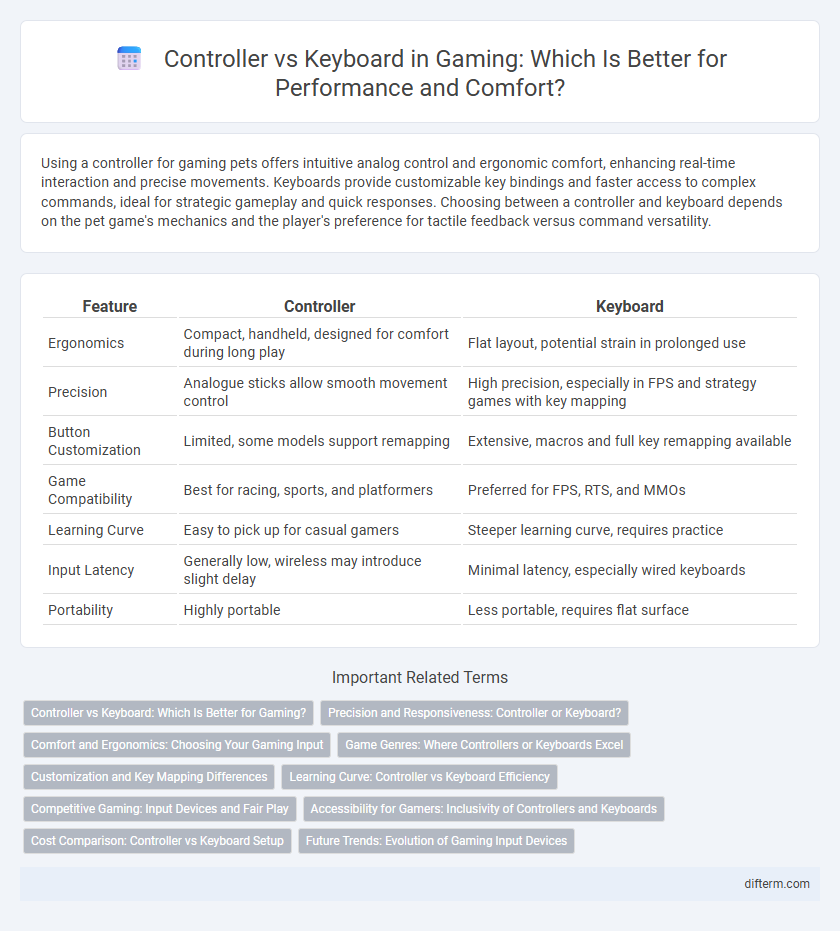Using a controller for gaming pets offers intuitive analog control and ergonomic comfort, enhancing real-time interaction and precise movements. Keyboards provide customizable key bindings and faster access to complex commands, ideal for strategic gameplay and quick responses. Choosing between a controller and keyboard depends on the pet game's mechanics and the player's preference for tactile feedback versus command versatility.
Table of Comparison
| Feature | Controller | Keyboard |
|---|---|---|
| Ergonomics | Compact, handheld, designed for comfort during long play | Flat layout, potential strain in prolonged use |
| Precision | Analogue sticks allow smooth movement control | High precision, especially in FPS and strategy games with key mapping |
| Button Customization | Limited, some models support remapping | Extensive, macros and full key remapping available |
| Game Compatibility | Best for racing, sports, and platformers | Preferred for FPS, RTS, and MMOs |
| Learning Curve | Easy to pick up for casual gamers | Steeper learning curve, requires practice |
| Input Latency | Generally low, wireless may introduce slight delay | Minimal latency, especially wired keyboards |
| Portability | Highly portable | Less portable, requires flat surface |
Controller vs Keyboard: Which Is Better for Gaming?
Controllers offer intuitive analog input and ergonomic design, enhancing gameplay in racing and action-adventure titles, while keyboards provide precise key mapping and faster response times essential for competitive shooters and strategy games. The choice between controller and keyboard depends on game genre, user preference, and required input precision, with controllers excelling in immersive console experiences and keyboards dominating PC gaming for complex commands. Hybrid setups combining both can maximize versatility and performance across diverse gaming styles.
Precision and Responsiveness: Controller or Keyboard?
Keyboards offer superior precision for rapid, complex inputs with customizable key bindings ideal for strategy and MMO games, while controllers excel in responsiveness through analog sticks and tactile feedback, providing smooth motion control in action and racing games. High-end gaming controllers feature low-latency connections and advanced haptics, enhancing immersive gameplay experiences, whereas mechanical keyboards deliver consistent key actuation for precise timing. Optimal choice depends on game genre, with keyboards favored for accuracy in FPS and MOBAs, and controllers preferred for fluid control in platformers and sports titles.
Comfort and Ergonomics: Choosing Your Gaming Input
Ergonomically designed gaming controllers offer enhanced comfort through contoured grips and intuitive button placements, reducing hand strain during extended play sessions. Mechanical keyboards with customizable key switches provide tactile feedback but may cause more wrist fatigue without proper wrist rests or adjustable angles. Prioritizing input devices with ergonomic features tailored to individual preferences significantly improves gaming performance and reduces the risk of repetitive strain injuries.
Game Genres: Where Controllers or Keyboards Excel
Controllers excel in action, racing, and fighting games due to their ergonomic design and analog stick precision, providing smooth movement and intuitive combo executions. Keyboards dominate in real-time strategy (RTS), first-person shooters (FPS), and massively multiplayer online (MMO) games, offering customizable key bindings and faster reaction times through tactile feedback. Many game genres increasingly support both input methods, but performance often hinges on the specific mechanics and player preference.
Customization and Key Mapping Differences
Controllers offer limited customization compared to keyboards, typically allowing only button remapping and sensitivity adjustments within games. Keyboards provide extensive key mapping flexibility through dedicated software or third-party tools, enabling users to create complex macros and reassign multiple keys for personalized gameplay. This granular customization enhances user experience by accommodating diverse play styles and accessibility needs.
Learning Curve: Controller vs Keyboard Efficiency
Controller gaming offers a gentler learning curve due to its intuitive button layout and ergonomic design, enabling quicker mastery for casual players. Keyboard efficiency excels in precision and customization, providing experienced gamers with faster input and complex command execution. Mastery of keyboard controls generally demands more time but results in higher performance flexibility compared to controllers.
Competitive Gaming: Input Devices and Fair Play
Competitive gaming demands precision and rapid response times, where controllers provide ergonomic comfort and analog input advantages, while keyboards offer customizable key bindings and faster click registration. Fair play standards often consider input device capabilities, with some esports tournaments enforcing strict rules on allowed hardware to maintain a level playing field. Understanding the nuances of controllers versus keyboards reveals the balance between hardware performance and regulatory fairness in professional esports.
Accessibility for Gamers: Inclusivity of Controllers and Keyboards
Controllers offer enhanced accessibility for gamers with limited mobility due to their ergonomic design and customizable button layouts, supporting a wider range of physical abilities. Keyboards provide extensive key mapping options and compatibility with assistive technologies, making them adaptable for gamers requiring specialized input methods. Both input devices contribute to inclusive gaming experiences by accommodating diverse needs through personalized configurations and accessibility features.
Cost Comparison: Controller vs Keyboard Setup
A basic gaming controller typically costs between $40 and $60, while a quality mechanical keyboard can range from $70 to over $200 based on features and build. Controllers often provide a more budget-friendly option for casual gamers, whereas keyboard setups, especially those with high-end switches and customization, involve a higher initial investment. Factoring in durability and versatility, keyboards may offer long-term value, but controllers remain cost-effective for straightforward gaming needs.
Future Trends: Evolution of Gaming Input Devices
Advancements in haptic feedback and adaptive sensors are shaping the future of gaming input devices, blurring the lines between controllers and keyboards. Motion-sensing controllers and customizable keypads offer enhanced immersion and precision, appealing to competitive and casual gamers alike. Emerging AI-driven input recognition technology promises to further revolutionize interaction by adapting controls to individual playstyles and accessibility needs.
controller vs keyboard Infographic

 difterm.com
difterm.com